| |
The Pooterland Interviews
Randy Holden
December 2001 |
| |
| |
|
| |
| |
Randy Holden's career spans over 40 years and many different bands. The first band he played with were The Iridescence back in 1959, their material being mostly Blues.
In the mid Sixties he joined The Fender IV and it was here that his guitar sound started to take shape. Then Randy joined the Sons Of Adam in 1966 and from here he formed The Other Half, a West Coast Garage Punk band who released 2 albums and 4 singles during the late 1960’s, their self titled album ending up more in psychedelic territory, but with Randy’s guitar style starting to shine through.
When The Other Half split, Randy replaced Leigh Stephens in the infamous West Coast Proto Metal band Blue Cheer bringing with him his now legendary guitar style and immense amplification techniques which took Blue Cheer to levels of sound never thought possible before.
After recording one album with Blue Cheer (New Improved! 1969) Randy left to pursue his eternal quest for the ultimate in amplified guitar sound and teamed up with drummer Chris Lockheed for what became a legendary solo album, Population II (1970) and they toured America with this ‘nuclear powered’ band that featured 16 Sunn amps (this was just for Randy!!).
The album never officially got released and Randy had some bad experiences with all his kit being stolen and he eventually turned his back on the music industry, unfortunately never really getting the recognition he deserved as a pioneering guitarist.
In the 1990’s after many months of ‘pestering’ by an obsessive fan Randy picked up a guitar again and headed into the studio.
In 1996 Randy released Guitar God, featuring former Blue Cheer drummer Paul Whaley on an unsuspecting public and it went down a storm. Recorded in 1997 and released in 2001 was the follow up, Guitar God 2001 with Randy Holden firmly back in the seat using an awesome custom ‘Glass’ guitar made for him as a present from his wife.
Randy kindly agreed to an interview with Dr. Dark and pOoTer in December 2001, here is the result:
pOoTers pSycheDelic shAcK: Can I go back to your very earliest days and ask what you remember of when you first picked up a guitar? What were your motivations? Did you seriously want to become a great guitarist, was it a fun thing, or was there some other reason behind your earliest attempts to master the guitar?
Hi Poot - guitar was an instant obsession with me from the first instant I became aware there was such a thing. When I had no money to buy one I made one from a yardstick thumb tacked to a piece of cardboard I cut in the shape of a guitar. I'm a born guitarist. It has a way of taking over my entire being that I forget everything else, so I have to kind of be careful with that ha ha ....
pOoTers pSycheDelic shAcK: How did you get on? Was it an uphill struggle or did you master the guitar relatively easily?
Guitar came to me as naturally as walking does to a child. There were odd moments of black outs when I had no inspiration at all, beyond that though, it possessed me totally.
pOoTers pSycheDelic shAcK: Did you attempt to learn any other instruments around about this time? I know you have recently spoken about the guitar as being the greatest instrument ever designed and I was wondering if you considered the possibilities of other instruments.
I had a fascination with the drums for a while, and then keyboards and harmonica, but there was nothing like guitar. |
| |
| |
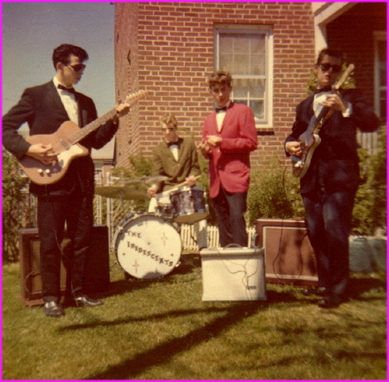 |
The Iridiscents |
| |
| |
pOoTers pSycheDelic shAcK: In your very in-depth and informative interview with Gabriel Lilliehook, where he asks you about your influences, you respond by talking about Dave Yorko (Red River Rock), the solo on Rock Around the Clock (which I agree is a classic) and Francisco Terraga.
Could you enlighten us further about who you were listening to in those days, and what it was about those guitarists that really got to you?
Dave Yorko just plain rocked with essential rock instinct, well organized, well executed and pioneering. But I listened to every guitar I could hear. The Flamenco music had such soul and passion it naturally fitted in rock to me, but whole rock was an emerging art form that was free. Rock as I see rock is more of what I would imagine what jazz is, jazz in the sense of freedom except rock is more structured and conceptual which in jazz is missing.
pOoTers pSycheDelic shAcK: Particularly Francisco Terraga, where would we hear his music?
Francisco Terraga was the 1800’s Flamenco inventor. You won't hear any original recordings, all you will hear are renditions by others who followed in his steps which is unfortunate. Andre Segovia took many of Terraga's pieces and reworked them, passed on the genius's work in his own genius forms, while keeping the essential melodic body - the music expressed emotional soul with such passion and nuance - compelling.
The power of the melodic composition did more to express human emotion in understandable terms that could be readily identified with reason to the passions, it held essential identity to the soul of existence. There was no question of to be or not to be, the question was a definitive is with a Will. The primal element of formative rock......rebellion against oppression of the soul.
pOoTers pSycheDelic shAcK: The Fender IV were, I believe, your first recorded band. The music on that Early Works album is just incredible!
Can you tell us about how the surf sound came about? I'm interested here in the origin of the sound as much as your own specific interpretation of it.?
Surf music as an identity formed on the west coast that arose out of the old dance ballrooms built in the 1920s carried into the 40s then again in the 60s. A forum for gathering dancing releasing energy in a positive form, apparently washed up on the shoes as everything in America is. Surf music was guitar driven, essentially instrumental music.
Dick Dale was a pioneer of sorts whose family derived from Lebanon. You don't have to go far to imagine his musical influences being raised with the mid-eastern influence of the original guitar and lute type instruments whose music was staccato picked melodies. He applied that music to electric guitar which was in it's infancy coming into full blown existence. Then there were the Ventures who took resources from great old classics of Southern Europe origins, without the staccato, but flooded with melodic verse.
Combine those with a multitude of other lesser known upstart bands, that is what was happening on the west coast of the US. I was on the opposite coast doing voluminous instrumental guitar, and some flamenco influences here and there, after I did the blues and R&B thing, so when I heard surf music it was already a thing I was meddling with, but no identity attached to it. I noticed when I would play loud, well not really loud for the sake of loud but loud that it moved you, people at the dances would stare at what I was doing while they danced. It was fascinating.
They didn't really understand it because it was so far removed from what they were familiar with, but they liked it and they knew they liked it. I don't think they knew how to react to it. My interpretation was a mix of all kinds of things, from Bill Dogget Blues riffs converted into surf sound along with Ventures stuff who did great renditions of old classics, and they did a lot of the Spanish oriented things.
I took all that and added a gigantic sound to it. It was moving to me. |
| |
| |
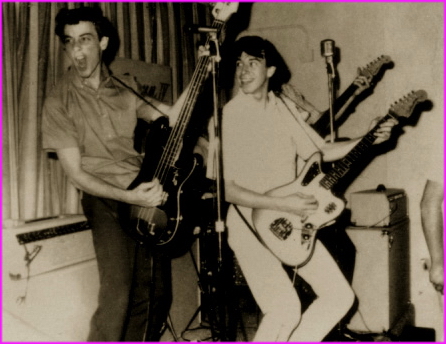 |
The Fender IV |
| |
| |
pOoTers pSycheDelic shAcK: Could you also tell us about your own personal interest in the surf sound? What was there about it that appealed to you (at that time) rather than, say, blues or R ‘n’B?
I was bored with Blues and R&B, it was the common music that everybody played and although I played a lot of it, I was more focused on guitar driven music, while Blues and R&B music was not primarily guitar oriented, but more horn oriented, and guitar was more a rhythm instrument. I was playing the R&B stuff for a few years before surf was born, and I kept leaning more into guitar as the center then surf came out and the fit was a natural identity.
pOoTers pSycheDelic shAcK: I hope you don't mind me asking you to speak for others, but did the surf sound of the mid-60’s have a contribution to the psychedelic sound of the later 60’s and early 70’s?
I'm thinking of the reverb and the emphasis on sheer speed of playing. Was this a bridge between rock 'n' roll and something new?
No they had nothing to do with each other. Surf music was popular in Southern California, and couldn't seem to take hold anywhere else - lack of ocean to relate to elsewhere and no doo wop doo waa to link everyone in, but the corporate record industry tried to link it by changing it to rebrand it as "Hot Rod Music", then the whole idea died on the vine out of it's clear crass commercialism invading a very private ego identity thing, some of the common elements were still there, but no soul connection to the backseat doo wop - surf music was more of a male dominated music that had little to do with feminine romantic inclinations, while girls were the primary driving force of record sales. Surf was a male ego absent the feminist conquering rebellion.
Surf music was the After the fact of love music, while doo wop was the foreplay, so the female audience while liking the domination stood off somewhat, not seduced, while males loved it, the power of dominating the wave, and all that cock strut stuff. When the corporate music business tried to change the identity of surf to Hot Rod to attract the feminine audience they essentially killed the surf music motive. They failed to connect the romantic vision of the Lamborhigini to the music, and instead put the grease in it, as another After the fact of love insulting act.
In the same stroke of history the English came over with their version of R&B and creative vocalizing and song writing, and that was all without reverb and very dry, linking in the doo wop along with rock a billy and Chuck Berry reviving his revolution - but the English did it with volume which kicked it all in a different direction.
I was already using exceptional volume, and the reverb for me was a translator I used for sustain more than anything, so it kind of naturally worked it's way together for what I was doing, but all the surf bands just washed away with the tide like so many castles made of sand........ and Jimi said "you will never hear surf music again" ....... but - what he was really doing was mocking the buttercup version of corporate surf the corporate money machine was trying to capitalize on, as it always does.
So his mockery had a good just cause at the watered down dried up version of corporate death inflicted on surf. Otherwise surf music has origins as deep as the oldest music in the universe that is as impossible to kill as the human spirit itself.
pOoTers pSycheDelic shAcK: In the Lilliehook interview, you also cite Jimi Hendrix as a great influence, with some insightful comments about how important the guitars and amplification were to his sound. Was Jimi the one great pioneer of that time or were there others?
I'm thinking back to your comments about the great rock ‘n’ roll guitarists, and also the influence of surf music.
The binder of Hendrix genius was his rhythmic sense - combine that with every other element and you have a great feast.
Take out a single crucial element and it can't come together. When the universe aligns - When all things come together in a moment of all things coming together, great things happen.
He was an inventive musician with exceptional technical comprehension, and ability to execute it, all the other factors came in at one time. Had not Marshall Amps made Marshall amps there would have been none of that.
I knew some musicians who were just off the scope with their sheer knowledge and execution, but they didn't have other elements e.g. drive, desire, the will to change, and move themselves from their place of familiar surroundings, or knowledge of equipment, or lack of complete rhythmic expression as a natural occurrence.
Imagine it this way, when they were doing the minuet at early American political balls, the tribes of Africa were dancing to the rhythm of their environment mimicking the creatures they revered. Imagine George Washington playing rock guitar.
I've always had an extremely difficult time getting music and politics to agree, or find any common ground. They always seem to be at extreme odds in eternal conflict, that if one is free the other is deprived. The conflict seems eternal, and I have only reconciled the conflict on rare occasion. Art and War - the art of war, the war against art, the unending conflict of oppositions that sometimes meet in rare agreement.
I have no idea what that has to do with your question, but that's where it took me. I don't remember what the question was anymore - oh - no question Hendrix was a pioneer on point in a culmination of space Time events. The typical response of Art to Politics in a time of great aberration and technological revolution invention in the face of the threat of destruction of Freedom internally. Hendrix freedom, engagement, beautiful melodic sense of music - capturing to this day.
He never entered surf music , but had an intrigue with it I understand. I was influenced by many many people - anyone who could make the guitar talk made me want to get up and seriously engage in some conversing.
pOoTers pSycheDelic shAcK: How much of his (Hendrix's) brilliance was due to technique and how much to the amplification and guitar technology that was becoming available?
Imagine it this way, had either element been absent, it would not have happened.
Mitch Mitchell was a major driving force beside him that challenged Hendrix to invent. Mitchell was as much inventor as Hendrix with one inspiring the other.
Noel Redding a guitarist holding some great R&B bass lines to pull the structure together that gave the whole body emotive rhythmic style. It was what it was, and it would not have happened without all the elements coming together at one moment.
pOoTers pSycheDelic shAcK: I would guess that bands like Blue Cheer were quick to see the potential of amplification as a way of expanding the range of effects you could get from a guitar.
Were you already experimenting with this before your time in Blue Cheer?
I don't think there were any bands ‘like’ Blue Cheer back then, they were the first, however I was already playing around with stuff.
pOoTers pSycheDelic shAcK: In their early days Blue Cheer were managed by Allen 'Gut Turk, who apparently named the band after a popular, strong variant of Owsley's LSD.
Is this true and was Gut still managing the band when you joined them?
I did met him once and he was a creative man, but I didn't know him. He was not in the picture at all by the time I joined Blue Cheer.
Pre ‘me’ was a different band than my version of Blue Cheer !! |
| |
| |
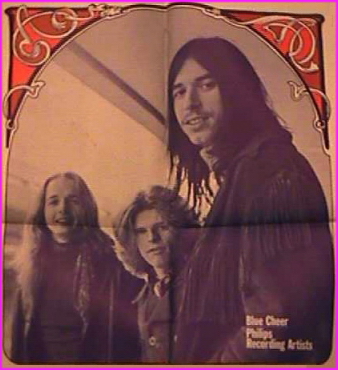 |
Blue Cheer |
| |
| |
pOoTers pSycheDelic shAcK: California was a place of great change and innovation in the late 60’s. How did the audiences react to the changes in the bands they were seeing?
How do you think they reacted to the great increase in volume of many of the bands?
No bands anywhere were into the volume thing in the 60s, except the English, and then only a few, like the Stones, then The Yardbirds, etc.
The Beatles were the first heavy metal band, believe it or not which was what was so great about them, their incredible ability to wrap bubble gum in heavy metal and vice versa.
Regardless where my bands played we had ten fold the volume of any other band, but I was really into the best equipment, it was a must for me, it moved me and when I moved the audience always was moved ...... kind of like race car driving, if you want to race you don't invest in a Buick onto the Gran Prix Monte Carlo track - you have to love it, and invest in what you love.
pOoTers pSycheDelic shAcK: Its probably fair to say that what are known today as '60's Punk/Garage Bands were a direct response to what Britain 'threw over' in the shape of The Beatles and The Stones.
Actually I would not go along with that idea.
pOoTers pSycheDelic shAcK: But didn’t American kids get hold of it and interpreted it in their own way and threw back 'Garage Bands'?. Interestingly nearly all of the Garage Bands produced a very much rawer sound than anything The Beatles or Stones ever did ....
Now you're beginning to touch on why I would not go along with the idea, those bands in the previous period were polished, and worked to polish and perfect their sound, they intentionally worked Not to be raw and rough ...... the pride was on musicianship, and crafting.
pOoTers pSycheDelic shAcK: But with heavy use of Distortion/Wah-Wah pedals and heaps of Farfisa organ it was different.
Were you aware at the time with the Fender IV and later The Other Half that there was actually an new type of music emerging that was very different from The British Invasion?
Music is always new to me in the general sense ..... maybe I'm the exception to the school of thought rule, but I am quickly bored in repetition, especially these days, I would prefer to create New things until I'm dead and gone rather than go play the same things over and over and over - they can be played over and over when I'm gone. But the creative process for me is a thing I have to steal time for.
pOoTers pSycheDelic shAcK: Your experimentation with various guitar/amp rigs has been pretty well documented elsewhere, but not much detail has been given to your use of effects pedals.
The 'Randy Holden Sound' is very distinctive with heaps of sustain and carefully applied distortion. What pedals have you tried in the past and what rig do you currently use?
The tools are not really the object for me, it's kind of like which came first, the music or the instruments ..... I try to imagine music in the music, then use a tool to field the music.
The tool only becomes important in the search to recreate and define the music in the mind. Not the other way around, and unfortunately it is usually taken in reverse. A lot like reading visual music sheets was considered a must if one wished to be a musician.
The sheet was an instrument of a visual recording that permitted music to be passed on. Like learning, which came first, the knowledge or the instruction book. I stay close to the source, otherwise it gets watered down into meaningless orchestral nothing ...... nothing could be more destructive to the soul of the music.
pOoTers pSycheDelic shAcK: Do you have particular memories of lightshows lifting the performances of the bands even higher?
No, but it enhanced a show when the guy playing with the color bowls with oil and paint was in with the feel of the rhythm.
I suppose when people began taking LSD and saw the light show that was a major stimulation of some kind. I didn't pay much attention unless someone would say, “Hey that was a good light show”.
If you are on the stage the light show is behind you, so you don't see it going on. It was a theatric thing. |
| |
| |
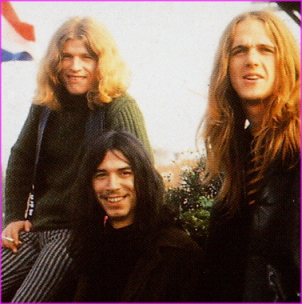 |
Blue Cheer |
| |
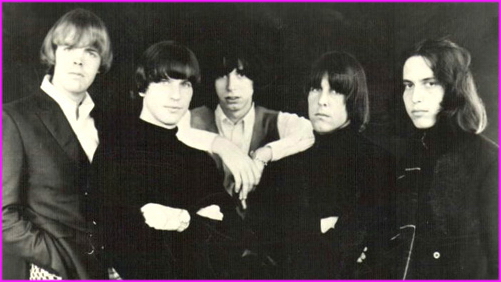 |
The Other Half |
| |
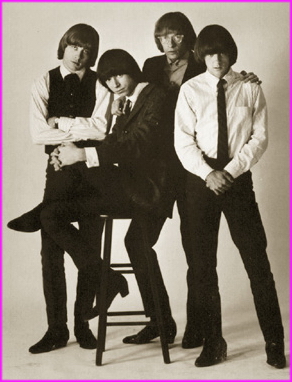 |
Sons Of Adam |
| |
| |
pOoTers pSycheDelic shAcK: Population II. That refers, I guess, to the fact that there were only two in the group, but I understand it is also a reference to astronomy and the rebirth of the stars in the heavens today from the first population of cosmic matter in the universe.
That's a very far out concept! Were you aware of that in the naming of the group? How far did you want to go with that deep significance of the name?
Population II is an actual identified type of Heavy Metal Star Groups in the astronomical universe. There is a Population I, Pop I and Population III type groups. I used to enjoy studying astronomy, I had a telescope and the whole nine yards and it would just blow me away to try and comprehend the universe.
When I was looking for an album concept title I came across the Heavy Metal Population Star groups, and that is what they are really called, because they actually have Heavy Metal substances as their chief chemical makeup. The idea seemed to fit with the music I was doing so perfectly, that's where Heavy Metal Music had it's birth, and that's where the phrase came from. You can look those star groups types up on the internet, and learn all about them. I couldn't think of a better term for the sound of the music we were doing, that was exactly what it was. So the term stuck. The album cover used the actual Population star group type II as the cover, and that's what it is.
The concept Population II had all kinds of nuance meaning attachments, so that's what was used. I actually discarded it a bit later and redid an entire other album cover, and we changed the name of the band to Lucifer, and as luck would play it's role it all went downhill from there ha ha ha ....... it was too far over the top for the time, seemed to scare everybody unaccustomed to thinking about much.
pOoTers pSycheDelic shAcK: The album cover (Population II) featured some superb photography and artwork. Loads of stars, echoing the cosmic theme of the name.
How much do you think the presentation of the package adds to people's enjoyment of the music?
I decided it wasn't representative enough ...... it was not ever released when I was around.
The visual artwork of LPs in the 60s was a point of attention in marketing, much like a brochure serves for anything you could have interest in buying.
The CDs of today do not have that large format Artwork marketing. A partial alternative has been things like MTV providing visual marketing, but the longer result has been the dilution of the whole into the 15 minutes of fame Andy Warhol envisioned, and he was a marketing expert, not an artist.
The two things are often confused having co-mingled.
pOoTers pSycheDelic shAcK: And were you involved in the choice of the art concept on the cover of that album?
Sure - this artist Michael Bryant was contracted by the record company to do the cover, and I told him I wanted a photo of the Population II star group superimposed behind an image of Chris and I.
But Michael apparently took some stay awake substance and hand copied every single star dot, and took a photo to put on top and that's what he came up with, but wasn't quite what I had in mind.
Orange is my least favorite color unless it has it's complimentary colors in it - Later Michael did another cover that was very very cool, and we were going to use that, but all things passed ....... |
| |
| |
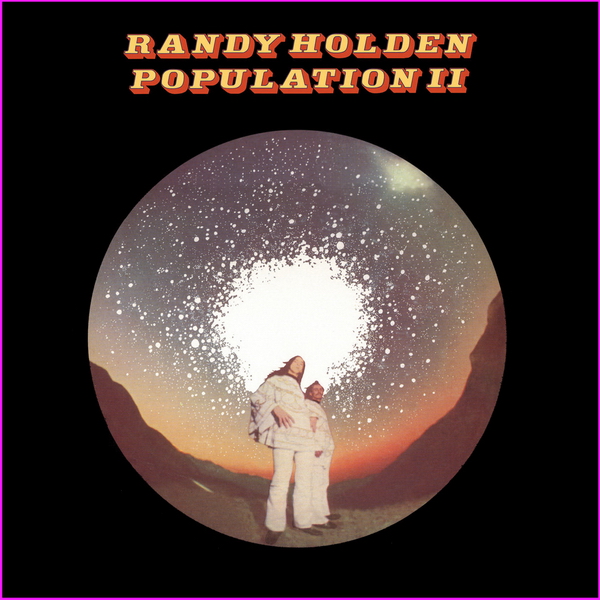 |
| |
| |
pOoTers pSycheDelic shAcK: Much of the mystique that surrounded Randy Holden was because of that elusive album.
I know you have reservations about the mastering of the album, but would you cite it as a good example of what you can do? Or of what you were doing at the time?
The finished mix was destroyed in mastering ..... so no one has ever heard what it really sounded like, which was pretty awesome, and nothing like the junk that was put out that really sounds flat and dead as opposed to being so alive you want to scream.
pOoTers pSycheDelic shAcK: Guitar Song as performed by Population II is one of my favourite songs, because it goes so much deeper than romantic love. It's not a boy meets girl? kind of song, it's about love of beauty as expressed by mastery of the guitar, which is kinda different and refreshing.
Also there's a great passion in the song. How do you go about writing a song? Where does the music theory end and the passion take over?
Glad you like it, in so far as girl meets boy love songs go, I thought little about those kinds of themes so overdone as to make one not wish to hear or play music - I have a tendency to get depressed over syrup lyrics designed for commercial purposes, and more interested in basic concepts of reality.
pOoTers pSycheDelic shAcK: The famous image of you and Chris Lockheed on stage with 16 Sunn amps always brings a smile to my face and I would have loved to have felt the full force of that rig, what was the power output of those stacks and did that represent the perfect sound for you after years of experimenting with Fender Showman's and Marshall's?
It represented for me, yet another search for a sound in the "Pursuit of Happiness".......
pOoTers pSycheDelic shAcK: Retrospectively what you did with Population II and to some respects Blue Cheer changed the face of guitar music forever and you arguably invented Heavy Metal as a result of this.
30 years on and with light years of both guitar and amp technology having gone under the bridge do you feel you got recognition for this?
I think among those who know, yes.
|
| |
| |
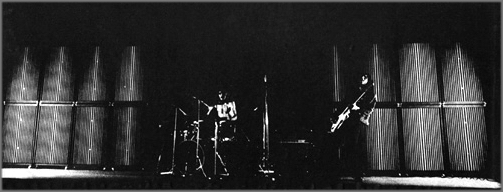 |
| |
| |
pOoTers pSycheDelic shAcK: You are renowned for having left the guitar alone for a long time and only coming back to it in recent years.
My own feeling is that you sound vibrant and it's like you've never been away! What's your own assessment of where you are after that long break?
A lot more in touch and clearer, more inspired, moved and fresh than if I would have remained in the music business burning myself to death in it trying to make it, by shoving it down my own throat. I enjoy what I do now more than ever, and a thousand times more than ever, and Ever is a long time when you think about it.......
pOoTers pSycheDelic shAcK: The Guitar God album of 1996 was a very welcome addition to the Randy Holden collection, but since your return, things seem to have got even better.
The Guitar God 2001 album is a quantum leap in creativity and inspiration since then. Would you agree that your latest works are a further improvement?
Yeah, I’d go with that, as mentioned previously things are much more inspired and fresh.
pOoTers pSycheDelic shAcK: Do you agree that musicians can become stale by practising (or working) too much?
Yeah, anytime you are robotic for the sake of being robotic and without inspiration, it's kind of like cooking when you aren't hungry, it's worse eating stale bread without water.
pOoTers pSycheDelic shAcK: What would you say led to the inspiration you have felt since you picked up the guitar again?
Something to do with the realizations of what is and what is not you might say.......
pOoTers pSycheDelic shAcK: Looking at your website it is clear that you are an excellent visual artist as well as a Guitar God.
Has that always been another side of your talents or did it develop while you were away from the music scene?
That's always been there, but I drift in and out of it randomly making excuses why I should or why I shouldn't pursue..... inspiration ...... glad you enjoy it ....
pOoTers pSycheDelic shAcK: I also notice on the Website your approval for Strunz and Farah, very entertaining acoustic guitarists. I checked the music and their site out, entirely due to your enthusiasm for their craft.
They are tremendously talented and it is interesting that you are impressed by them even though they are worlds apart from Guitar God 2001.
Do you pay close attention to other music that's being released today?
Strunz & Farah are a very good example of the roots of Surf Music.
pOoTers pSycheDelic shAcK: There are similarities in your music with Florida guitarist Terry Brooks who played in a similar style to yourself in band called Terry Brooks & Strange (although he often favoured very fast passages in between distortion laden riffs), are you familiar with any of his work?
Also what other musicians are you listening to at the moment?
No I am not aware of the name, as far as listening to music, I have to steal time to create music for myself so, unfortunately I don't get to listen to much except by accident.
pOoTers pSycheDelic shAcK: The world has undoubtedly changed in the past few weeks, and I was wondering if you think the values of the 60?s have any relevance today?
No - they don't ! The great protest of the 60s was the absence of an enemy in direct view on US soil - all the sophisticated reasons in the world looked more like excuses amidst a sense of deception, mitigating trust in government.
That environment introduced the invention of the invisible terrorist enemy whose aim is the total destruction of all freedom by forcing government to turn ever more restrictive to gain security. It's the ultimate card to hold to destroy freedom.
I think it was Jefferson who said "he who surrenders freedom for security has neither".
pOoTers pSycheDelic shAcK: The 'Glass' guitar your wife had made for you, has this finally allowed you to achieve the sound you spent so many years striving for?
Can you give us a bit more detail about it's construction and features? Is it actually a Fender?
It's an experiment that worked!!, a custom guitar made of Lucite, although it does have a few problems, primarily it has the usual physical limitations that anytime you begin to get close to heaven it breaks - in the case of this guitar the molecular structure of the neck sets up a velocity of the neck vibrating that surpasses the velocity of the string vibration that causes strings to explode when things get heated up.
Same as amps burning up when entering the ‘glow zone’, or anything at it's limits. |
| |
| |
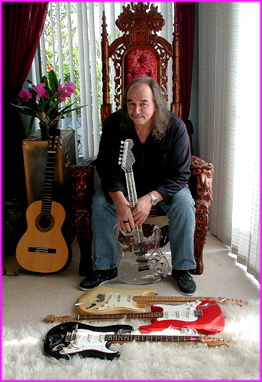 |
Randy Holden - 2000 |
| |
| |
pOoTers pSycheDelic shAcK: Finally, we would all love to see you here in Europe (and of course the USA and Australasia, to name but a few) and we hope you have ironed out the challenges involved in bringing your massive sound out on the road.
Now there's a challenge not sorted out yet!!.
pOoTers pSycheDelic shAcK: We all relish the chance to see you and hope it won't be long.
Thanks for the wishes!!.
Interview conducted by pOoTer & Doctor Dark - Pooterland Crew |
| |
| All images Copyright © Randy Holden, all Rights Reserved. |









